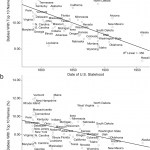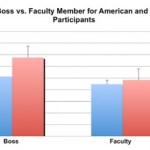Social Psychology
My latest piece for LAist just went up:
Retail therapy: It's the answer for almost any problem. Girlfriend broke up with you? Didn't get that promotion? Buy yourself something pretty. People like to shop, especially for high-status items, when they're feeling down. Decades of research has indicated that when a key feature of one's identity is threatened - such as by being passed over for a promotion or being dumped by a former lover - people turn to things. Possessions can allow us to signal our awesomeness to others. And if others think we're awesome, then we just might begin to remember…
Welcome to the third installment of Animal Territoriality Week. See part 1 here, and part 2 here.
In 1994, a disease called sarcoptic mange swept through Bristol's fox population, severely crippling the population and killing most of the individuals. Professor Stephen Harris of the University of Bristol, who had been studying the movements and territories of those foxes, noticed that as the animals in one territory died, neighboring foxes were able to colonize the vacant areas in 3-4 days. He suspected that this was because the scent marks of the foxes remained active for 3-4 days, but didn'…
Welcome to Territoriality Week! Every day this week, I'll have a post about some aspect of animal or human territoriality. How do animals mark and control their territories? What determines the size or shape of an animal's territory? What can an animal's territory tell us about neuroanatomy? Today, I begin by asking two questions: first, what is the functional purpose of establishing territories? Second, to what extent can we apply findings from research on animal territorial behavior to understanding human territorial behavior?
It seems that everyone becomes an amateur animal behaviorist…
PsychBytes is an experiment: three recent findings in psychology, each explained in three paragraphs or less. Generally, these are papers that I wouldn't have otherwise covered in this blog. Please share your thoughts on this model in the comments. What works, and what doesn't? Would you like more PsychBytes in the future?
What's In A Name?
People who settle down and build a life in the frontier tend to be more individualistic, even if they started out with more interdependent values. Some features of the frontier life that would be attractive to an independent person are low population…
"At home, a young man should be dutiful towards his parents; going outside, he should be respectful towards his elders." -Confucius (Chinese philosopher, 551-479 BCE)
"Your real boss is the one who walks under your hat." -Napoleon Hill (American author, 1883-1970)
Those two quotations reflect a cultural difference in how people construct their own conceptions of who they are and how they interact with others. That the particular culture an individual is raised in helps to determine the way they understand the self is clear. Western cultures, such as in America or the UK, tend to focus on…
Painstaking scientific research has identified seven dating tips that could boost your chances on Valentine's Day ... including shouting in his right ear and scaring him witless.
Whether or not you have a Valentine this year, head on over to check out to my latest piece in The Guardian: Valentine's Day dating tips from lovestruck scientists.
Photo: Getty Images/Brand X
What's the best way for a lonely guy to get a date? If you're a Splendid Fairy-Wren (Malurus splendens, native to Australia), your best bet might be to frighten the object of your affection.
You've learned all about the birds and the bees; now it's time to learn from them.
Lots of research has shown that animals reduce their sexual behaviors when predators are around. After all, it isn't just potential mates who would see or hear an elaborate mating display, but also potential predators. The male splendid fairy-wren does something a little bit unusual, though. Gray Butcherbirds (Cracticus…
If there is one book that every human should read, it is The Invisible Gorilla, by Chris Chabris and Dan Simons.
I suppose that's a pretty bold statement to make. Let me explain. As a student of psychology, and as someone who studies and writes about the mind, I am overwhelmed with the general perception among the lay public that "social science findings often reaffirm or echo what common sense observations tell us." But the truth is that common sense observations often lead us astray. We have very little insight into the way our minds actually operate. And the thing is, this is likely a…
APPLYING for a job? The weight of the clipboard to which your CV is attached may influence your chances of getting it. Negotiating a deal? Sitting in a hard chair may lead you to drive a harder bargain. Those are two of the surprising conclusions of a study published in today's issue of Science, which shows that the physical properties of objects we touch can unconsciously influence our first impressions of other people and the decisions we make about them.
Josh Ackerman of the Sloan School of Management at MIT, and psychologists Chris Nocera and John Bargh of Harvard and Yale Universities,…
I've been watching with interest a recent kerfuffle involving a relatively new blog in the sciblogosphere, Academic Jungle, which is written by the pseudonymous blogger GeekMommyProf.
Prof-Like Substance has already written a good summary of recent events, so I won't duplicate his efforts. Instead, I'll duplicate his text! (Bracketed bold text inserted by me):
GeekMommyProf started a blog about a month ago, which burst onto the scene in a hurry. Most blogs (including this one) toil in obscurity for a while, eventually gain some steam and get enough readers coming back to get talked about a…
If you're a regular reader of Peter and Travis's blog, Obesity Panacea, you may have heard one of their semi-regular blogcasts. Well, since Peter is traveling the world (read about it here), Travis asked me to join him for a blogcast. While discussing topics that we could discuss, a sent a few links and papers his way, and he was like "ugh, self-report." And I was like, "dude, self-report makes the world go around."
Okay, so the conversation may not have gone exactly like that, but the outcome was we decided to go ahead and talk about the relative merits of self-report data in science.
As he…
Some kids more readily recognize Ronald McDonald than the President of the United States of America. Sad, right?
Check out this exchange, from the 2004 movie Super Size Me:
Morgan Spurlock: [to kids] I'm gonna show you some pictures and I want you to tell me who they are.
Children: OK.
Morgan Spurlock: [Showing a picture of George Washington] Who's that?
Child: George Washington?
Morgan Spurlock: Good. Who was he?
Children: He was the 4th president. He freed the slaves. He could never tell a lie.
Morgan Spurlock: [Shows picture that you can't see] Who's that?
Child: George W. Bush?
Morgan…
Happy Earth Day, everyone!
In honor of the day, here's a modified re-post of piece I wrote recently for LAist.
Figure 1: Photo by poloroid-girl via LAist Featured Photos on Flickr.
The great philosopher Kermit the Frog once said, "It's not that easy being green." Maybe he was on to something.
You can't walk three steps down an aisle in any store without running into eco-friendly or "green" products. You probably have many of these products. Is your refrigerator or dishwasher Energy-star compliant? Do you have a paperless Kindle? Maybe bamboo guest towels in the bathroom? A Prius?
Why do you…
Social Cognition in Dogs, or How did Fido get so smart?. This you know:
Domesticated dogs seem to have an uncanny ability to understand human communicative gestures. If you point to something the dog zeroes in on the object or location you're pointing to (whether it's a toy, or food, or to get his in-need-of-a-bath butt off your damn bed and back onto his damn bed). Put another way, if your attention is on something, or if your attention is directed to somewhere, dogs seem to be able to turn their attention onto that thing or location as well.
Amazingly, dogs seem to be better at this than…
tags: Story of Stuff, environment, pollution, climate change, global warming, recycling, social commentary, cultural observation, planned obsolescence, perceived obsolescence, fashion, advertizing, social psychology, streaming video
From its extraction through sale, use and disposal, all the stuff in our lives affects communities at home and abroad, yet most of this is hidden from view. The Story of Stuff is a 20-minute, fast-paced, fact-filled look at the underside of our production and consumption patterns. The Story of Stuff exposes the connections between a huge number of environmental…
LANGUAGE contains many sayings which link our feelings and behaviour towards others to temperature. We might, for example, hold "warm feelings" for somebody, and extend them a "warm welcome", while giving somebody else "the cold shoulder" or "an icy stare". Why is that we have so many metaphors which relate temperature to social distance? According to George Lakoff, a professor of cognitive science and linguistics at the University of California, Berkeley, we judge others on the basis of warmth because abstract concepts, such as affection, are firmly grounded in bodily sensations.
There is…
tags: Who Blogs, blog writing and personality, Big Five personality inventory, social psychology, technology, computers, internet, researchblogging.org
You all read blogs, and many of you write them, too. But what sort of person writes a blog? Are there particular personality traits that make certain people more likely to write a blog? If so, what are those personality traits? Do you have them, too?
A team of scientists, led by psychologist Rosanna Guadagno from the University of Alabama, wondered what personality traits made some people more likely than others to write blogs. To answer…






